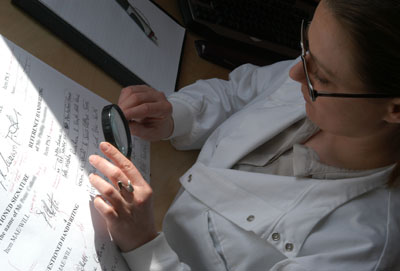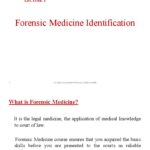The allure of forensics is undeniable. Television dramas and true crime podcasts have cultivated a widespread fascination with the meticulous science behind solving mysteries. While most consume these narratives passively, the opportunity to engage directly with a forensic examiner presents a far more compelling, and often daunting, prospect. Many find themselves tongue-tied, unsure of how to initiate a productive conversation with someone possessing such specialized knowledge. Approaching a forensic examiner, be it a document specialist or a serologist, requires a mindful strategy. This article provides a pragmatic guide to fostering meaningful dialogue, moving beyond superficial inquiries and venturing into the substantive core of their expertise.
1. Establishing Context and Purpose: Laying the Groundwork
Before launching into specific queries, it is paramount to establish a clear context for your inquiry. What is the overarching reason for seeking the examiner’s input? A vague, unfocused approach is likely to yield equally vague responses. If, for instance, your interest lies in forensic document examination, articulate this explicitly. Is your focus on handwriting analysis, ink dating, or paper fiber composition? Specificity is your ally.
Clearly delineate the scope of your interest. Are you a student researching forensic science careers? Are you a writer seeking authentic details for a novel? Are you involved in a legal matter where forensic expertise might be relevant? Transparency regarding your purpose not only streamlines the conversation but also allows the examiner to tailor their responses to your specific needs and level of understanding.
2. Formulating Intelligent Questions: Beyond the Superficial
The quality of your questions directly influences the quality of the information you receive. Avoid simplistic, easily Googleable queries. Instead, craft questions that demonstrate genuine curiosity and a baseline understanding of the forensic discipline in question. For example, rather than asking “What does a forensic document examiner do?”, consider “What are some of the common limitations encountered when attempting to date inks using microspectrophotometry?” This level of detail signals that you have invested time in preliminary research and are seeking nuanced insights.
Delve into specific methodologies and instrumentation. Inquire about the role of gas chromatography-mass spectrometry (GC-MS) in analyzing trace evidence, or the application of polarized light microscopy in identifying asbestos fibers. Engage with the examiner on the challenges they face, such as sample contamination or the interpretation of ambiguous results. Remember, the goal is to elicit detailed explanations and demonstrate your intellectual engagement with the subject matter.
3. Active Listening and Empathetic Engagement: Cultivating a Rapport
Communication is a two-way street. Active listening is just as crucial as asking insightful questions. Pay close attention to the examiner’s responses, noting not only the factual content but also the underlying nuances and caveats. Forensic science is rarely black and white; interpretations are often subjective and dependent on the specific circumstances of each case.
Show empathy for the challenges inherent in forensic work. Acknowledge the pressures of maintaining objectivity, adhering to strict protocols, and dealing with emotionally charged cases. Express appreciation for the meticulousness and rigor required in their profession. This fosters a sense of mutual respect and encourages the examiner to share their expertise more openly.
4. Navigating Jargon and Technical Terminology: Seeking Clarification
Forensic science is replete with specialized jargon and technical terminology. Do not hesitate to ask for clarification if you encounter unfamiliar terms or concepts. It is far better to admit your ignorance than to feign understanding and risk misinterpreting crucial information. Request that the examiner explain complex concepts in layman’s terms, or provide illustrative examples to aid your comprehension.
Be prepared to do your own research to supplement the examiner’s explanations. Look up unfamiliar terms or techniques online, consult relevant textbooks or scientific publications, and formulate follow-up questions to further refine your understanding. This demonstrates your commitment to learning and enhances the overall value of the interaction.
5. Respecting Boundaries and Confidentiality: Ethical Considerations
It is imperative to respect the boundaries and confidentiality constraints inherent in forensic work. Examiners are often bound by legal and ethical obligations to protect sensitive information and maintain impartiality. Avoid probing into ongoing cases or seeking information that could compromise the integrity of an investigation.
Refrain from asking for opinions on specific cases or individuals. Instead, focus on general principles, methodologies, and challenges within the forensic discipline. Be mindful of the examiner’s time and expertise, and express your gratitude for their willingness to share their knowledge. A respectful and ethical approach will not only foster a positive relationship but also ensure that future interactions are equally fruitful.
6. Following Up and Maintaining Contact: Nurturing a Professional Relationship
After your conversation, send a thank-you note or email expressing your appreciation for the examiner’s time and insights. Summarize key takeaways from the discussion to demonstrate that you have actively processed the information provided. If appropriate, offer to share any relevant research or resources that you may have come across.
Maintaining contact with forensic examiners can be invaluable, especially if you are pursuing a career in the field. Attend forensic science conferences, participate in online forums, and network with professionals in your area. Building a strong network of contacts will provide access to mentorship opportunities, research collaborations, and potential job prospects. By approaching these interactions with respect, intellectual curiosity, and a genuine desire to learn, you can unlock a world of knowledge and forge lasting connections within the fascinating realm of forensic science.










Leave a Comment